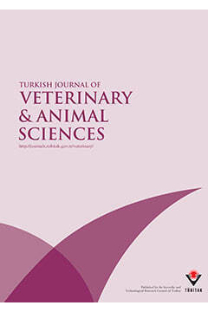Immunohistochemical Localization of Cytokeratin, Vimentin and Alpa-Smooth Muscle Actin Micro and Intermediate Filaments in Canine Mammary Tumors
Forty-six formalin-fixed paraffin-embedded canine mammary tumors, 15 benign and 31 malignant, were studied immunohistochemically. Mouse monoclonal anti-alpha-cytokeratin 18, mouse monoclonal anti-alpha-cytokeratin (pan cytokeratin), mouse monoclonal anti-alpha-smooth muscle actin and mouse monoclonal anti-vimentin antibodies were used. The ductal and acinar epithelium stained positively for cytokeratin 18 and pan cytokeratin, although there was no immunoreactivity in some tumors. Metaplastic squamous cells in two solid carcinomas were positive for both cytokeratin 18 and pan cytokeratin. It was a notable finding that there were unreactive epithelial cells in some tumors for broad spectrum cytokeratin antibody (pan cytokeratin). Myofibroblasts in benign and malignant tumors were positive for both vimentin and alpha-smooth muscle actin antibodies. Stromal mesenchymal tissues, including metaplastic cartilage and bone, stained strongly positive for vimentin antibody. The majority of cells in two spindle cell carcinomas were immunoreactive with alpha-smooth muscle actin, being indicative of the myoepithelial origin of these tumors. Myoepithelial proliferation was prominent in ductal papilloma (1/1), benign mixed tumor (1/5), tubular adenocarcinomas (3/6), papillary adenocarcinomas (3/4), papillary cystic adenocarcinomas (2/3), solid carcinomas (4/8) and malignant mixed tumors (2/4). These proliferated cells stained positively for alpha-smooth muscle actin antibody except for those of a tubular adenocarcinoma, papillary adenocarcinoma and solid carcinoma. The absence of immunoreactivity with alpha-smooth muscle actin in chondromucinous stroma, cartilage and bone indicated that cartilage and bone formation in canine mammary tumors results from stromal metaplasia. The results of this study provide further evidence for the value and usefulness of immunohistochemical methods using monoclonal antibodies in formalin-fixed paraffin-embedded canine mammary tumors.
Immunohistochemical Localization of Cytokeratin, Vimentin and Alpa-Smooth Muscle Actin Micro and Intermediate Filaments in Canine Mammary Tumors
Forty-six formalin-fixed paraffin-embedded canine mammary tumors, 15 benign and 31 malignant, were studied immunohistochemically. Mouse monoclonal anti-alpha-cytokeratin 18, mouse monoclonal anti-alpha-cytokeratin (pan cytokeratin), mouse monoclonal anti-alpha-smooth muscle actin and mouse monoclonal anti-vimentin antibodies were used. The ductal and acinar epithelium stained positively for cytokeratin 18 and pan cytokeratin, although there was no immunoreactivity in some tumors. Metaplastic squamous cells in two solid carcinomas were positive for both cytokeratin 18 and pan cytokeratin. It was a notable finding that there were unreactive epithelial cells in some tumors for broad spectrum cytokeratin antibody (pan cytokeratin). Myofibroblasts in benign and malignant tumors were positive for both vimentin and alpha-smooth muscle actin antibodies. Stromal mesenchymal tissues, including metaplastic cartilage and bone, stained strongly positive for vimentin antibody. The majority of cells in two spindle cell carcinomas were immunoreactive with alpha-smooth muscle actin, being indicative of the myoepithelial origin of these tumors. Myoepithelial proliferation was prominent in ductal papilloma (1/1), benign mixed tumor (1/5), tubular adenocarcinomas (3/6), papillary adenocarcinomas (3/4), papillary cystic adenocarcinomas (2/3), solid carcinomas (4/8) and malignant mixed tumors (2/4). These proliferated cells stained positively for alpha-smooth muscle actin antibody except for those of a tubular adenocarcinoma, papillary adenocarcinoma and solid carcinoma. The absence of immunoreactivity with alpha-smooth muscle actin in chondromucinous stroma, cartilage and bone indicated that cartilage and bone formation in canine mammary tumors results from stromal metaplasia. The results of this study provide further evidence for the value and usefulness of immunohistochemical methods using monoclonal antibodies in formalin-fixed paraffin-embedded canine mammary tumors.
